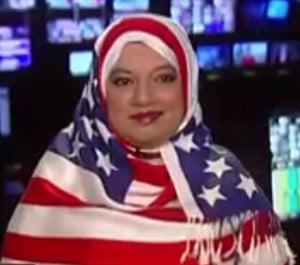Aged patronizing feminists, young veiled victims (of Islamist threat), and endangered laïcité éternelle (everlasting secularism): those were the main ingredients of a huge media bubble blown into people’s minds in France this summer.
It all started with the sketch of a proposition bill: André Gérin, a left-wing deputy and mayor asked in June the French Parliament to create an Enquiry Commission into the wearing of burqa. His text, co-signed by 58 other deputies, aimed to define legally the length of fabric compatible with the French Republic constitution. Gérin, instead of either tackling the collapse of his own party, or caring for the 700,000 unemployed in expectation for this year (Insee, June 2009), is pitting his political strength against a much more decisive issue: how to prevent the 367 women wearing a burqa–among 3.7 millions of Muslims based in France–to “invade” the public space.
This project of mere exclusion is presented though as a “Republican fight” in favor of the “enlightened Islam” (Le Point, 19 June 2009). Gérin depicted himself as a secularist savior, knowing Islam better than the Muslims themselves as he brings them (“them” being French nationals, too) the lights of civilization.
Even though he is supposed to be a communist, Gérin apparently never heard about the “Dialectic of Enlightenment”, conceptualized by the German philosopher Theodor Adorno. According to Adorno, the Enlightenment, which started as a rational project of liberation, ended up in a myth: “The Enlightenment has always aimed at liberating men from fear and establishing their sovereignty. Yet the fully enlightened earth radiates disaster triumphant.”
The triumph of Enlightenment disaster in the French Republic is getting worse as it is reinforced by a deeply rooted Orientalist bias towards Islam and inheritance of its colonial past.
A few days later, during a congress, President Nicolas Sarkozy confirmed the communist deputy’s concern. He said the burqa represented a view that was “different from the Republic’s view on women’s dignity” (LCP, 22 June 2009). It might be useful at that point to remember that the “Republic’s view on women’s dignity” is the sequel of what gave French women the right to vote in 1945, after all the other countries of Europe and Turkey (whose inclusion in the European Union is rejected by most of the French politicians in the name of a Turkish democratic deficit).
More importantly, this “burqa alert” media bubble is offering again an opportunity for the whole political spectrum to find an agreement: this time over what could and should be shown of the Muslim women’s body. This unanimity has been echoed and reinforced by self-proclaimed experts, either of Islam or feminism, displaying publicly their recurrent prejudices against the minority of Muslim women in France who wear a burqa.
Among them, Elisabeth Badinter was the most vehement and visible on television (France 2 – Mots-Croisés, 29 June 2009). Badinter is an accomplished business woman in the media industry, but she prefers portraying herself as a philosopher and feminist, keeping her lucrative and not less influent activities far away from the public sphere.
She wrote a short but very aggressive article in Le Nouvel Observateur (9 July 2009) entitled: “To those who voluntarily wear a burqa”. The enlightened philosopher speaks to the savages with veils:
“Why don’t you move to Saudi Arabia or Afghanistan where nobody would ask to see your face, where your daughters would be veiled too and where your husband would be polygamous and repudiate you whenever he wants?”
That’s Elisabeth Badinter’s vision of Saudi Arabia and Afghanistan, as a kind of monstruous and homogenous land in which she can allow her Islamophobic fantasies to soar.
In this patronizing and haughty letter, Badinter unwillingly makes a decisive point: the way she is addressing those women, not as the poor victims of some sexist men with beards, but as autonomous subjects, implicitly acknowledges the fact that they are actually making a choice of their own. And this is, in the last instance, the truth of the word “feminism”, whether feminists like it or not.
The media bubble has not burst yet. It looks more like an almost-extinguished chimney fire now: as far as the political debate in the Assembly has not started, mainstream journalists would keep up the combustion, caring for this little flame and feed it if necessary, in case they probably don’t find something more exotic to report about.
But some are explicitly pushing the anti-burqa agenda. Those strong supporters of une laïcité à la française are oblivious of the historical background of such a concept (cf. Elizabeth Shakman Hurd, the Politics of Secularism in International Relations, Princeton University Press, 2007) and the witch-hunt they unjustly instigate is at the end far away from the rationality they allegedly defend.











